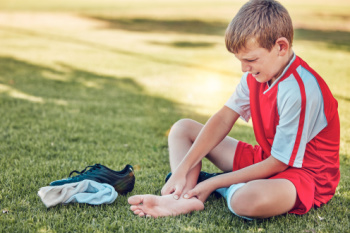It is never normal for a child to experience pain in his or her feet. Foot pain that lasts more than a few days and limits a child’s ability to walk should be examined by a podiatrist. Many adult foot ailments originate in childhood and may be present at birth. Common foot issues that are experienced by children are pediatric flat foot, Sever’s disease, ingrown toenails, and plantar warts.
A child’s foot grows rapidly during the first year, allowing it to reach almost half of their adult foot size. Consequently, foot specialists consider the first year to be the most crucial point in the foot development process. There are ways you can help ensure that your child’s foot develops properly. One way is to carefully look at your baby’s feet. If you notice any deformities, you should immediately seek professional care. You should also loosely cover your child’s foot, since tight coverings may prevent movement and inhibit normal development. Another tip is to change the baby’s positioning throughout the day. If your baby lies down in one spot for too long, it may put an excess amount of strain on the feet and legs.
It is best that you try not to force a child to start walking. Children will begin to walk when they are both physically and emotionally capable to do so. You should also avoid comparing your child’s walking progress with other children because the age range for independent walking may range. When your child’s feet begin to develop, you may need to change both their shoe and sock size every few months to allow room for their feet to grow.
Kids are sometimes prone to splinters, cuts, and severe injuries because they tend to walk around barefoot. This also makes them more susceptible to developing plantar warts which is a condition caused by a virus that invades the sole of the foot through breaks in the skin. These ailments can be avoided by making sure your child wears shoes in unsanitary environments. You should also wash any minor cuts or scrapes on your child’s feet. It is a myth that exposure to fresh air will heal injuries; fresh air will only expose your child’s cuts to germs.
As a parent, you should ensure that your child’s feet are developing properly and are being properly maintained. Consequently, it is important that you perform routine inspections on his or her feet to detect any injuries or deformities in their early stages. Early detection and treatment will help to ensure that your child does not develop any serious foot conditions.

Child athletes frequently experience foot and ankle injuries due to the physical demands of sports. Activities such as soccer, basketball, and gymnastics place significant stress on these areas, increasing the risk of sprains, fractures, and overuse injuries. Ankle sprains are particularly common, often resulting from sudden changes in direction or missteps. Overuse injuries in child athletes, such as stress fractures and tendon inflammation, can develop when repetitive motions strain the bones and soft tissues without adequate recovery time. Growth plate injuries are another concern, as the developing bones in children are more vulnerable to damage, which may affect long-term growth. Ignoring persistent pain or swelling may lead to chronic issues and a higher risk of re-injury. A podiatrist can evaluate your child’s condition, provide treatment to manage the pain and swelling, and recommend ways to prevent future injuries, such as wearing proper footwear and activity modifications. If your child experiences foot pain after sports activities, it is suggested that you schedule an appointment with a podiatrist for an exam and treatment options.
The health of a child’s feet is vital to their overall well-being. If you have any questions regarding foot health, contact Bruce Smit, DPM of Frankfort Foot & Ankle Clinic. Our doctor can provide the care you need to keep you pain-free and on your feet.
Tips for Keeping Children's Feet Healthy
If you have any questions, please feel free to contact our office located in Frankfort, IL . We offer the newest diagnostic and treatment technologies for all your foot care needs.